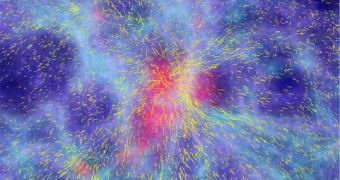Since the Big Bang model established what happened at the beginning of the Universe with a fairly high degree of certainty, astronomers have been divided about how the entire thing will end. Some even say that it will not end at all.
Over the years, numerous proposals dealing with the upcoming end of the Universe have been set forth, some of them carrying more merit than the others. At this point, the main two possibilities are the Big Crunch theory and the endless void theory. The Big Rip and Big Freeze are also popular contenders.
It could be that the entire Cosmos will eventually start to slow down its ever-accelerating expansion, until it finally stops. As that happens, gravity will prevail, and the entire construct will be drawn in on itself, in a process called the Big Crunch.
What this theory implies is that everything inside the Universe at that time will be compacted into a singularity similar to a supermassive black hole. Needless to say, all stars and galaxies will be no more.
At the same time, it may be that the Universe will continue to expand at its current rate for all eternity, eventually becoming an endless void in which galaxies are separated by billions of light-years. People living on a planet in this setup would see very few stars on the night sky.
“The truth is that [the ultimate fate of the Universe is] still an open scenario. We certainly don't know for sure what's going to happen,” Stanford University astrophysicist Steve Allen. The sad thing is that we have no way of knowing what will actually happen.
Regardless of which scenario proves correct, the ultimate conclusion will take billions to trillions of years to reveal itself. By that time, the probability that the human race will still be around is minimal.
“Today we look up in the sky and we see just fantastic things; galaxies, clusters of galaxies stretching out all over the sky,” Space quoted Allen as saying. The researcher explains that the endless void theory would transform the Universe to an extent we cannot possible fathom today.
“But if the expansion is going to get faster and faster, eventually those galaxies will get pulled too far away for us to see. Space becomes an ever- less beautiful and rich place. The Universe becomes a relatively lonely place,” he explains.
In the end, the most important factor in determining how everything will go down is dark energy, the mysterious force making up 73 percent of the entire Universe. Since we haven't yet detected it, or even proven that it exists, there is no way to use it in these investigations of the future.

 14 DAY TRIAL //
14 DAY TRIAL //